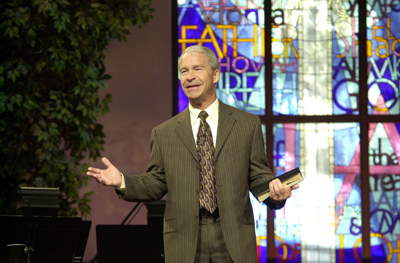
(RNS) The Rev. Joel Hunter, a megachurch pastor from suburban Orlando, Fla., is a spiritual confidant of President Obama, although he keeps the substance of their conversations private. Religion News Service file photo courtesy of Northland Church.
ORLANDO, Fla. (RNS) Next Wednesday (April 21), the Rev. Joel Hunter’s Florida megachurch will hold what organizers bill as the largest ever faith-based gathering to celebrate Earth Day.
Organizers say the simulcast from Hunter’s Northland Church will draw thousands of churches of all faiths in partnership with Blessed Earth, a nonprofit organization dedicated to spreading environmentalism among churches.
Hunter, 61, is part of a new vanguard of influential leaders pushing evangelicalism beyond traditional hot-button social issues. He prayed with President Obama on Inauguration Day and served on the White House’s Advisory Council on Faith-Based and Neighborhood Partnerships. He is on the board of the National Association of Evangelicals and has lobbied Congress on climate change.
His congregation draws more than 10,000 on Sundays to its four locations around Orlando and online. Hunter talked about Earth Day, climate change and “Avatar.” Some answers have been edited for length and clarity.
Q: Tell me about the Earth Day event. How did Northland get involved?
A: Through my involvement in what we call creation care, I met Matthew and Nancy Sleeth (of Blessed Earth). We formed a friendship, and when this brainchild of his came up, he knew we were a church of remarkable technology. He came to us, and I said we’d be glad to do it because this is what we do.
Q: Are we seeing a new religious environmental movement — people who see environmental protection as not only a scientific issue, but a moral one as well?
A: Yes. There is a growth from simply an anthropocentric theology to a Christocentric theology. That means the story of evangelical theology is not so much getting someone saved and getting them to heaven, but it is Christ redeeming not only the individual person but all creation as well. You’re seeing a transformation of, or a maturity of, interpreting Scripture to do with God’s broader agenda of redemption to things, beyond just the personal, individual salvation.
Q: The environmental movement has pitted science against religion and Christians against Christians. You’ve written that there is “money to be made and self-righteousness to be reinforced by living in disparate worlds.” Do you see these groups beginning to find common ground?
A: Yes. Of course there will always be people who profit from polarization, and there will always be the fearful and parochial extremist voices. However, there is a growing cooperation and mutual respect and appreciation.
Q: You pushed for that. You pushed evangelicals to embrace issues beyond gay marriage and abortion. Why is this important to you?
A: First of all, I see this as a pro-life issue. I see all of these issues as necessary for extending and enhancing life. It’s important for Christians to cooperate with people who they may have traditionally thought of as adversaries because, frankly, the problems in this world are too big for any one group to solve. Christians have to mature in their theology and in their practice of their faith to the point that they are practical and not just ideological.
Q: Do you think climate change is real?
A: Yes. I think the overwhelming evidence says that climate change, though nonlinear and unpredictable, is very real and that we need to address the pollutants in order to reduce the consequences.
Q: Did you see “Avatar”? What did you think?
A: We don’t agree with the theology of “Avatar.” Nonetheless, we embrace the overall message that we don’t exploit, we don’t take advantage, and we prize the creation.
And by the way, the thing that was not mischaracterized in the film is that part of the reason for preserving biodiversity is the healing properties hidden in nature. That’s not theological; that’s scientific. If we destroy the biodiversity of the world, we are destroying many of the remedies that God has hidden or embedded in much of the natural world.




